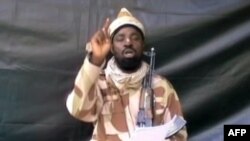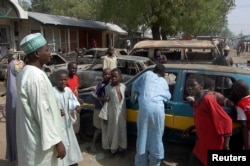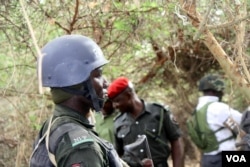ABUJA —
After the Nigerian government announced that militant group Boko Haram had agreed to a cease-fire, Abubakar Shekau, the man believed to be the group’s leader, released a video denying the claim. While Shekau called for increased violence, some analysts say Boko Haram is fractured and some part of the group may have actually agreed to a cease-fire.
The latest video released by Abubakar Shekau makes considerable use of video editing tools, like a cartoon instant-camera printing a picture of Shekau, which spins around as it fills the screen.
Speaking in Arabic, his native Hausa language and even a little in English, Shekau says he is the leader of the militant group known popularly by its nickname, Boko Haram, which means “Western education is sinful” in Hausa.
He said the government’s announcement of a truce agreement was a “farce” and there will be no peace until Western-type schools are replaced with Islamic schools. He also called for the end of constitutional law and democracy.
He praised the recent massacre of students and teachers in Yobe State, where as many as 42 people died when gunmen opened fire and threw explosives in a secondary school. Most of the victims were children. Shekau calls for further violence against schools and teachers, but claims it was not his men that killed the children.
Analysts say even though Shekau says it was not his men, it could have been others who call themselves part of the group.
Boko Haram is shadowy and ever-changing, says John Campbell, a senior fellow at the Council on Foreign Relations and a former U.S. ambassador to Nigeria.
“I think this takes us back to the perennial question of what is Boko Haram. It is highly diffused, by definition fragmented, made up of many different elements, not a centrally organized organization,” he said.
Boko Haram has been blamed for thousands of deaths since it began attacking churches, schools, government offices, security forces, media houses, banks and markets in 2009. Security forces have been accused of ratcheting up the violence by killing suspects instead of arresting them and holding people indefinitely without charges.
Campbell says Boko Haram appears to have a basic criminal element as well, evidenced by regular attacks on banks.
The Nigerian government has announced successful peace talks with Boko Haram at least three times in the past year, claims that were later denied by Shekau. But Campbell says because the group is splintered, both the government and Shekau could be telling the truth.
"Possibly you could have a cease-fire with some part of it, but not other parts,” he said.
Three northern Nigerian states have been under emergency rule for two months, after President Goodluck Jonathan sent thousands of troops to fight Boko Haram. The military has claimed to have killed scores of militants, arrested hundreds and re-taken Boko Haram-occupied territories - claims that can not be independently verified because of roadblocks and shut-down mobile phone service.
University of Abuja Institute for Anti-Corruption Studies Kabir Mato says another crisis is brewing in those states. Farmers have been cut off from their fields by emergency rule and the already poor region is growing more hungry.
Mato says if Nigeria's military does not relax the emergency rule security gains might be short lived, because poverty is driving the insurgency.
“To me that is the only way you can forestall the possibility of plunging into a deeper ocean of poverty in the next five months, in the next six months, the next one year, which again has the implication of the resurgence of more serious violence," said Mato.
Other analysts say it is fanaticism, not poverty that has made northern Nigeria so dangerous.
In the latest video, an AK-47 rifle rests on Shekau’s shoulder as he rails against what he calls the “infidel government.” And while this leader is clearly all about ideology, it is not clear who his foot soldiers are or what their reasons are for fighting.
Ardo Hazzad contributed to this report from Bauchi.
The latest video released by Abubakar Shekau makes considerable use of video editing tools, like a cartoon instant-camera printing a picture of Shekau, which spins around as it fills the screen.
Speaking in Arabic, his native Hausa language and even a little in English, Shekau says he is the leader of the militant group known popularly by its nickname, Boko Haram, which means “Western education is sinful” in Hausa.
He said the government’s announcement of a truce agreement was a “farce” and there will be no peace until Western-type schools are replaced with Islamic schools. He also called for the end of constitutional law and democracy.
He praised the recent massacre of students and teachers in Yobe State, where as many as 42 people died when gunmen opened fire and threw explosives in a secondary school. Most of the victims were children. Shekau calls for further violence against schools and teachers, but claims it was not his men that killed the children.
Analysts say even though Shekau says it was not his men, it could have been others who call themselves part of the group.
Boko Haram is shadowy and ever-changing, says John Campbell, a senior fellow at the Council on Foreign Relations and a former U.S. ambassador to Nigeria.
“I think this takes us back to the perennial question of what is Boko Haram. It is highly diffused, by definition fragmented, made up of many different elements, not a centrally organized organization,” he said.
Boko Haram has been blamed for thousands of deaths since it began attacking churches, schools, government offices, security forces, media houses, banks and markets in 2009. Security forces have been accused of ratcheting up the violence by killing suspects instead of arresting them and holding people indefinitely without charges.
Campbell says Boko Haram appears to have a basic criminal element as well, evidenced by regular attacks on banks.
The Nigerian government has announced successful peace talks with Boko Haram at least three times in the past year, claims that were later denied by Shekau. But Campbell says because the group is splintered, both the government and Shekau could be telling the truth.
"Possibly you could have a cease-fire with some part of it, but not other parts,” he said.
Three northern Nigerian states have been under emergency rule for two months, after President Goodluck Jonathan sent thousands of troops to fight Boko Haram. The military has claimed to have killed scores of militants, arrested hundreds and re-taken Boko Haram-occupied territories - claims that can not be independently verified because of roadblocks and shut-down mobile phone service.
University of Abuja Institute for Anti-Corruption Studies Kabir Mato says another crisis is brewing in those states. Farmers have been cut off from their fields by emergency rule and the already poor region is growing more hungry.
Mato says if Nigeria's military does not relax the emergency rule security gains might be short lived, because poverty is driving the insurgency.
“To me that is the only way you can forestall the possibility of plunging into a deeper ocean of poverty in the next five months, in the next six months, the next one year, which again has the implication of the resurgence of more serious violence," said Mato.
Other analysts say it is fanaticism, not poverty that has made northern Nigeria so dangerous.
In the latest video, an AK-47 rifle rests on Shekau’s shoulder as he rails against what he calls the “infidel government.” And while this leader is clearly all about ideology, it is not clear who his foot soldiers are or what their reasons are for fighting.
Ardo Hazzad contributed to this report from Bauchi.







